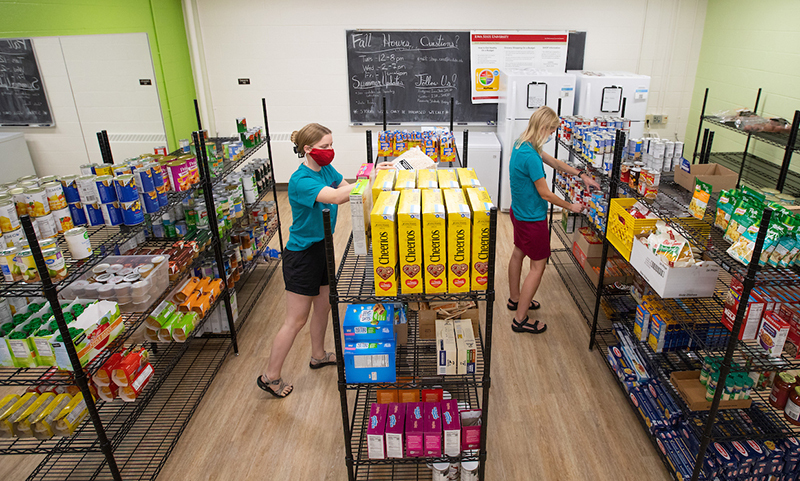Capstone projects teach leadership, build up campus
Author: Anne Krapfl
This is an archived story. The content, links and information may have changed since the publication date.
Author: Anne Krapfl
Numerous useful and thoughtful projects have bubbled up across campus in the last five years -- "Principles of Community" banners along Morrill Road; a rejuvenation of the student food pantry SHOP; a course proposal, gear kit and best practices for University Library on collecting oral history; a website to honor students who die during their ISU years, for example.
The thread that connects about 20 seemingly disparate projects is the annual Emerging Leaders Academy (ELA), a nine-month leadership development program for faculty and professional and scientific staff organized by the provost's office. Five years ago, its organizers replaced a faculty mentor component with a capstone concept: team projects that make Iowa State a kinder, more accessible community in which to work or study.
The intent, according to ELA co-director Katharine Hensley, faculty success coordinator in the provost's office, is to provide an interactive experience that builds on learned skills, helps class members develop lasting connections across campus and compels teams to collaborate -- or at least consult -- with administrators and staff in units impacted by capstone plans.

A fundraising blitz spearheaded last spring by an ELA capstone team raised $11,300 that helped with about $15,000 in improvements at the SHOP student pantry, including new floor, paint and counter; interior wall for a food storage area, iPads and food scales; and additional shelving. Photo by Christopher Gannon.
"The capstone might be the best way they learn about leadership, because they're doing leadership as a team," Hensley said.
Even when things go sideways -- as they inevitably do every year for one or more teams -- "They're gaining insight into what they'd do differently. The missteps are what you grow from the most," she said.
Hensley coordinates ELA with professor of veterinary clinical sciences Rod Bagley. Using a handful of variables, they assign four project teams from among a cohort's 24-30 members and recommend a few parameters as teams hone in on projects:
That third bullet often causes the most anxiety, Hensley said.
"We try to emphasize scope from the beginning. If they think too big, or if they don't clearly define their outcomes, often it doesn't turn out the way they anticipated," she said.
Accurately assessing a real need also helps a capstone effort succeed. Three years ago, ELA member Sarah Wilson, now in student services in the Ivy College of Business, worked in the College of Human Sciences and watched her colleague, director of multicultural student success (DMSS) Carmen Flagge, struggle to keep afloat a gently used career clothing pop-up shop for students. Wilson's capstone team adopted the shop and did substantial "fact finding" to see if Iowa State could collaborate with an existing consignment store or student organization. Not finding a good match, ultimately, they approached student government and submitted a funding request on behalf of Flagge and other DMSSs behind the pop-up shop.
In spring 2019, student government approved a five-year commitment of nearly $23,000 each year to support the business attire pop-up shop, which collects donations year-round for two free distribution events a year.
It was a game-changer. Flagge said the annual support is used primarily for three needs: two student interns who promote the events on social media and set up the shop; climate-controlled storage off campus for the clothing items between pop-up shops; and industrial-grade supplies and equipment that help make the shop happen: hangers, mirrors, clothing racks, clothing collection bins and the like. From 71 students at the first pop-up shop in spring 2018, the event now serves 400-700 students from all seven colleges each semester.
"It was a lot of work, but I enjoyed immensely the work with my team," Wilson recalled this week. "You think you're in ELA to work on developing yourself, but there's also this really worthwhile project you want to make sure succeeds.
"All of those experiences helped us develop relationships around campus that I still have today," she said.
This year's four capstone teams shared their projects with classmates as part of their April 15 session. On May 9, they'll gather one more time for a graduation celebration. Here's a summary of their work and where you might find it:
At the conclusion of their presentations, Bagley congratulated class members for "projects that have impact," which is the goal every year for every project.
And then he added, "You've reached base camp. Your journey continues."